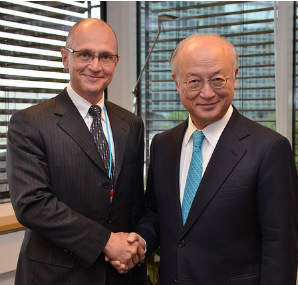Russia has signed two independent agreements for the early stages of nuclear new-build in Jordan and South Africa at the IAEA general conference in Vienna.

Russia has signed two independent agreements for the early stages of nuclear new-build in Jordan and South Africa at the IAEA general conference in Vienna.
First, Dzhomart Aliev, CEO of Rusatom Overseas, and Dr. Khaled Toukan, Chairman of the Jordan Atomic Energy Commission, signed a project development agreement on construction of a nuclear power plant in the province of Zarqa in Central Jordan. The province extends southeast from the industrial city of Zarqa (northeast of capital Amman) in a narrow strip 150km to the Saudi Arabian border.
Rusatom Overseas said that the document sets obligations of the parties for the first stage of the two-unit nuclear power plant construction project with total capacity of 2000 MW. It also said that the project phase that has now started will result in a contract for nuclear power plant construction that is planned to be signed in about two years.
In 2010, Jordan shortlisted three reactors as preferred bidders: the AES-92 VVER-1000, AECL’s EC6 and AREVA and MHI’s Atmea1.
The second deal, an intergovernmental agreement agreement on strategic partnership and cooperation in nuclear energy and industry, with South Africa, is not so decisive, but could be much larger.
Rusatom International Network, a subsidiary set up in 2014 to oversee foreign marketing offices, reports that the agreement lays the foundation for procurement and development of nuclear power based on up to eight VVER reactors with a total installed capacity of 9.6 GWe.
The agreement also provides for ‘comprehensive collaboration’ in other areas of nuclear power, including building a Russian research reactor, assistance in building up South Africa’s nuclear infrastructure, educational placements of South Africans, and other areas.
Rosatom director Sergey Kirienko said: "Rosatom seeks to create in South Africa a full-scale nuclear cluster of a world leader’s level – from the front-end of nuclear fuel cycle up to engineering and power equipment manufacturing. In future this will allow to implement joint nuclear power projects in Africa and third countries. But from the very start this cooperation will be guided at providing the conditions for creation of thousands of new jobs and placing of a considerable order to local industrial enterprises worth at least 10 billion US dollars."
South African minister of energy Tina Joemat-Pettersson said, "This agreement opens up the door for South Africa to access Russian technologies, funding, infrastructure, and provides a proper and solid platform for future extensive collaboration."
According to the World Nuclear Association, South Africa’s governmental nuclear agency Necsa signed a broad agreement with NIAEP-Atomstroyexport to develop a strategic partnership, including access to funding in November 2013.
In 2010, the country wound up funding for development of the Pebble Bed Modular Reactor project.
Picture: Bilateral meeting between Sergey Kirienko, Director General of ROSATOM and IAEA Director General Yukiya Amano at the IAEA 58th General Conference, 22 September 2014.
